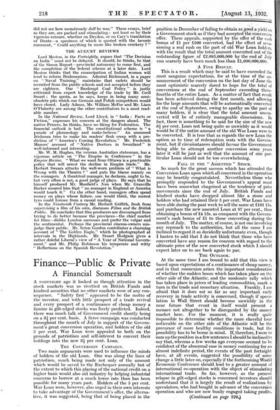THE AUGUST REVIEWS
Lord Meston, in the Fortnightly, argues that "The Decision on India " must not be delayed. It should, he thinks, be that of the Simon Report—provincial autonomy to come first, and the completion of the federal scheme at a later date. Lord Meston thinks that the emancipation of Indian women will tend to reform Brahmanism. Admiral Richmond, in a paper on " Naval Training," maintains that cadets should be recruited from the public schools and not accepted before they are eighteen. Our " Bankrupt Coal Policy " is justly criticized from expert knowledge of the trade by Mr. Cecil Smart ; the quota, as he says, keeps in being many semi- obsolete pits which our German and Polish competitors would have closed. Lady Adams, Mr. William McFee and Mr. Liam O'Flaherty are among the other contributors to a most read- able number.
In the National Review, Lord Lloyd, in " India : Facts or Fiction," expresses his concern at the. dangers ahead. The native Princes, he thinks, have no liking for Federation. The financial outlook is bad. The constitutional scheme is " a parade of phraseology and make-believe." An unnamed Irishman tries to make his readers' flesh creep with a pre- diction of " America's Coming Revolution." Mr. Frederick Manors' account of " Native Doctors in Swaziland " is well-informed and interesting.
Mr. W. M. Hughes, the veteran Australian statesman, has a vigorous article on " The Empire in Conference " in the Empire Review. " What we want from Ottawa is a practicable policy that will arrest the decline in Empire trade." Mr. Herbert Swears attacks the well-worn problem of " What is Wrong with the Theatre ? " and puts the blame mainly on the managers. A theatrical manager, he declares, ought to be, but very often is not, a good judge of plays. He says that he himself produced Mr. Manfield's Nan when Mr. Granville Barker assured him that " no manager in England or America would touch it." On the other hand, managers often spend money on plays whose failure, one would think, the merest tyro could foresee from a casual reading.
In the Nineteenth Century Mr. Herbert Griffith, fresh from supervising a film of his own, discusses Films and the British Public. He concludes that film producers are discouraged from trying to do better because the provinces—the chief market for films—dislike London successes and prefer the vulgar and the sentimental. Perhaps the provincial cinema-owners mis- judge their public. Mr. Seton Gordon contributes a charming account of The Golden Eagle," which he photographed at intervals in the Highlands. Mr. Stuart Hodgson gives a rather doleful Liberal's view of " A Year of National Govern- ment," and Mr. Philip Robinson his temperate and witty " Reflections on the Spanish Revolution."






























 Previous page
Previous page